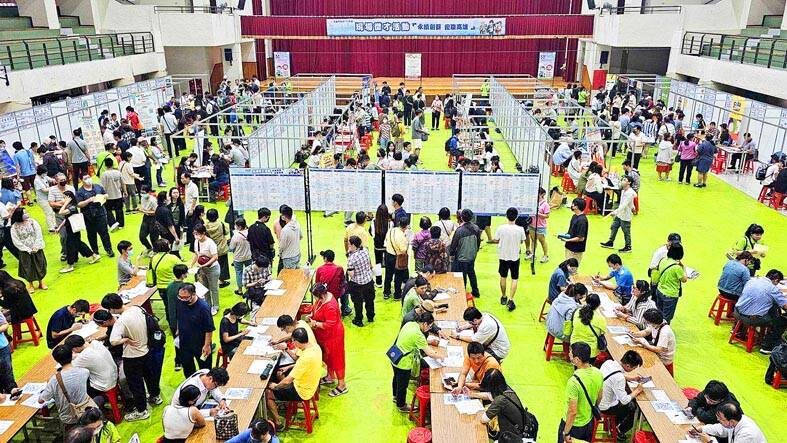The nation’s unemployment rate last month edged up to 3.45 percent, rising 0.06 percentage points from one month earlier to the highest in 10 months, owing to increases in the number of first-time jobseekers and people who quit, the Directorate-General of Budget, Accounting and Statistics (DGBAS) said yesterday.
However, the latest jobless data represented the lowest in 24 years for the month of July, suggesting a stable market, Census Department official Chang Yi-sui (張一穗) said.
The unemployment figures after seasonal adjustment held steady at 3.34 percent compared with one month earlier, Chang said, painting the uptick as seasonal.

Photo courtesy of the Kaohsiung Bureau of Labor Affairs.
It is common for the jobless gauge to grow 0.004 to 0.09 percentage points between June and August due to an influx of new graduates seeking work, he said.
Altogether, the number of unemployed people rose by 9,000, or 2.13 percent, to 415,000 after the number of first-time jobseekers increased by 5,000 and the number of people who quit picked up by 4,000, the DGBAS said.
At the same time, the number of people who worked for fewer than 35 hours a week increased by 14,000, the agency’s report said.
The average period of unemployment stood at 20.2 weeks, dropping by 0.6 weeks from one month earlier, the DGBAS said.
The duration was shorter for first-time jobseekers at 15.8 weeks and extended to 21.4 weeks for other groups, it said.
By educational attainment, people with a university degree had the highest unemployment rate at 4.67 percent, followed by high-school graduates at 3.26 percent, people with junior college diplomas at 2.74 percent and people with a graduate degree at 2.64 percent, the agency found.
People with junior-high school or lower education had the lowest unemployment rate at 2.09 percent, it said.
Meanwhile, people aged 20 to 24 had the highest unemployment rate at 12.13 percent, followed by the 15-to-19 age bracket at 9.12 percent, and the 25-to-29 group at 5.87 percent, the agency said.
The jobless rate moderated to 3.37 percent among people aged 30 to 34, stood at 2.71 percent for those aged 35 to 39, averaged 2.51 percent for people aged 40 to 44, and at 2.16 percent for people aged 45 and 64, the DGBAS said.
The nation’s seasonally adjusted unemployment rate of 3.34 percent is higher than Hong Kong’s 3 percent, South Korea’s 2.5 percent and Japan’s 2.5 percent, the agency said.

STILL HOPEFUL: Delayed payment of NT$5.35 billion from an Indian server client sent its earnings plunging last year, but the firm expects a gradual pickup ahead Asustek Computer Inc (華碩), the world’s No. 5 PC vendor, yesterday reported an 87 percent slump in net profit for last year, dragged by a massive overdue payment from an Indian cloud service provider. The Indian customer has delayed payment totaling NT$5.35 billion (US$162.7 million), Asustek chief financial officer Nick Wu (吳長榮) told an online earnings conference. Asustek shipped servers to India between April and June last year. The customer told Asustek that it is launching multiple fundraising projects and expected to repay the debt in the short term, Wu said. The Indian customer accounted for less than 10 percent to Asustek’s

‘DECENT RESULTS’: The company said it is confident thanks to an improving world economy and uptakes in new wireless and AI technologies, despite US uncertainty Pegatron Corp (和碩) yesterday said it plans to build a new server manufacturing factory in the US this year to address US President Donald Trump’s new tariff policy. That would be the second server production base for Pegatron in addition to the existing facilities in Taoyuan, the iPhone assembler said. Servers are one of the new businesses Pegatron has explored in recent years to develop a more balanced product lineup. “We aim to provide our services from a location in the vicinity of our customers,” Pegatron president and chief executive officer Gary Cheng (鄭光治) told an online earnings conference yesterday. “We

LEAK SOURCE? There would be concern over the possibility of tech leaks if TSMC were to form a joint venture to operate Intel’s factories, an analyst said Taiwan Semiconductor Manufacturing Co (TSMC, 台積電) yesterday stayed mum after a report said that the chipmaker has pitched chip designers Nvidia Corp, Advanced Micro Devices Inc and Broadcom Inc about taking a stake in a joint venture to operate Intel Corp’s factories. Industry sources told the Central News Agency (CNA) that the possibility of TSMC proposing to operate Intel’s wafer fabs is low, as the Taiwanese chipmaker has always focused on its core business. There is also concern over possible technology leaks if TSMC were to form a joint venture to operate Intel’s factories, Concord Securities Co (康和證券) analyst Kerry Huang (黃志祺)

It was late morning and steam was rising from water tanks atop the colorful, but opaque-windowed, “soapland” sex parlors in a historic Tokyo red-light district. Walking through the narrow streets, camera in hand, was Beniko — a former sex worker who is trying to capture the spirit of the area once known as Yoshiwara through photography. “People often talk about this neighborhood having a ‘bad history,’” said Beniko, who goes by her nickname. “But the truth is that through the years people have lived here, made a life here, sometimes struggled to survive. I want to share that reality.” In its mid-17th to